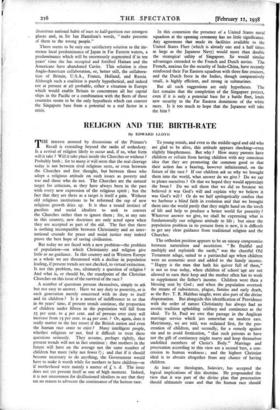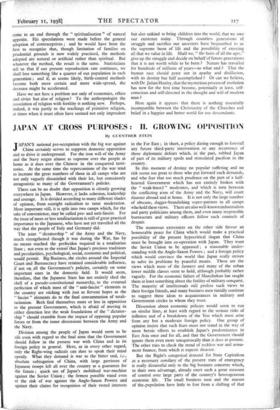RELIGION AND THE BIRTH-RATE
By EDWARD LLOYD
THE interest aroused by discussions of the Primate's Recall is extending beyond the ranks of orthodoxy. Is a revival of religion likely to occur and, if so, what form will it take ? Will it take place inside the Churches or without ? Probably both ; for to many it will seem that the real cleavage today is not between rival religious sects, or even between the Churches and free thought, but between those who adopt a religious attitude on such issues as poverty and war and those who do not. The Churches are the natural target for criticism, as they have always been in the past with every new expression of the religious spirit ; but the fact that they are there as a target is itself a gain. Without old religious institutions to be reformed the sap of new religious growth dries up. It is thus a sound instinct of pacifists and social idealists to seek to convert the Churches rather than to ignore them ; for, at any rate in this country, new doctrines are only acted upon when they are accepted as part of the old. The fact that there is nothing incompatible between Christianity and an inter- national crusade for peace and social justice may indeed prove the best hope of saving civilisation.
But today we are faced with a new problem—the problem of population—on which Christianity and religion give little or no guidance. In this country and in Western Europe as a whole we are threatened with a decline in population leading, if present trends are not checked, to virtual extinction. Is not this problem, too, ultimately a question of religion ? And what is, or should be, the standpoint of the Christian Churches on this issue of the survival of the race ?
A number of questions present themselves, simple to ask but not easy to answer. Have we any duty to posterity, or is each generation merely concerned with its duty to itself and its children ? Is it a matter of indifference to us that in 6o years' time, if present trends continue, the proportion of children under fifteen in the population will fall from 23 per cent. to 4 per cent. and of persons over sixty will increase from 13 per cent. to 44 per cent. ? Or, again, does it really matter in the last resort if the British nation and even the human race cease to exist ? Many intelligent people, whether religious or not find it difficult to treat these questions seriously. They assume, perhaps rightly, that present trends will not in fact continue ; that mothers in the future will have on the average not the same number of children but more (why not fewer ?) ; and that if it should become necessary to do anything, the Government would have to make it worth while for mothers to have children—as if motherhood were mainly a matter of £ s. d. The issue does not yet present itself as one of high moment. Indeed, it is not uncommon for disillusioned idealists to say that they see no reason to advocate the continuance of the human race. To young minds, and even to the middle-aged and old who are glad to be alive, this attitude appears shocking—even slightly blasphemous. But why ? How many parents have children or refrain from having children with any conscious idea that they are promoting the common good or that their action has a bearing, however infinitesimal, on the future of the race ? If our children ask us why we brought them into the world, what answer do we give ? Do we say to please ourselves ? Or that we hoped they would appreciate the boon ? Do we tell them that we did so because we believed it was God's will and explain why we believe it was God's will ? Or do we half apologetically confess that we harbour a blind faith in evolution and that we brought them into the world partly that they might hand on the torch of life and help to produce a better world for posterity ? Whatever answer we give, we shall be expressing what is fundamentally our religious attitude to life ; but since the population problem in its present form is new, it is difficult to get any clear guidance from traditional religion and the Churches.
The orthodox position appears to be an uneasy compromise between naturalism and asceticism. " Be fruitful and multiply and replenish the earth," was the cheerful Old Testament adage, suited to a patriarchal age when children were an economic asset and added to the family income. " Happy is the man that hath his quiver full of them," is not so true today, when children of school 'age are not allowed to earn their keep and the mother often has to work to supplement the father's income. Children were then a blessing sent by God ; and when the population overtook the means of subsistence, plague, famine and early death, as the Rev. T. R. Malthus taught, were also part of the divine dispensation. But alongside this identification of Providence with the order of nature Christianity has always had an ascetic tradition upholding celibacy and continence as the ideal. To St. Paul we owe that passage in the Anglican marriage service which jars somewhat on modern ears. Matrimony, we are told, was ordained first, for the pro- creation of children, and secondly, for a remedy against sin and to avoid fornication, " that such persons as have not the gift of continency might marry and keep themselves undefiled members of Christ's Body." Marriage and procreation according to this view are a second best, a con- cession to human weakness ; and the highest Christian ideal is to abstain altogether from any chance of having children.
At least one theologian, Soloviev, has accepted the logical implications of this doctrine. He propounded the view that it was part of the divine plan that procreation should ultimately cease and that the human race should come to an end through the ” spiritualisation " of natural appetite. His speculations were made before the general adoption of contraceptives ; and he would have been the first to recognise that, though limitation of families on prudential grounds is now widely practised, the methods adopted are natural or artificial rather than spiritual. But whatever the method, the result is the same. Statisticians tell us that if our present reproduction rate continues, we shall lose something like a quarter of our population in each generation ; and if, as seems likely, birth-control methods become both more certain and more wide-spread, the decrease might be accelerated.
Have we not here a problem not only of economics, ethics and civics but also of religion? To the anthropologist the association of religion with fertility is nothing new. Perhaps, indeed, it was partly to the teachings of primitive religion, at times when it must often have seemed not only imprudent but also unkind to bring children into the world, that we owe our existence today. Through countless generations of struggle and sacrifice our ancestors have bequeathed to us the supreme boon of life and the possibility of enjoying all that we value in life. Shall we, " the heirs of all the ages," give up the struggle and decide on behalf of future generations that it is not worth while to be born ? Nature has travailed for hundreds of millions of years—to what end ? That the human race should peter out in apathy and disillusion, with its destiny but half accomplished ? Or can we believe, with Dr. Julian Huxley, that the mysterious process of evolution has now for the first time become, potentially at least, self- conscious and self-directed in the thought and will of modern man ?
Here again it appears that there is nothing essentially incompatible between the Christianity of the Churches and belief in a happier and better world for our descendants.



















































 Previous page
Previous page